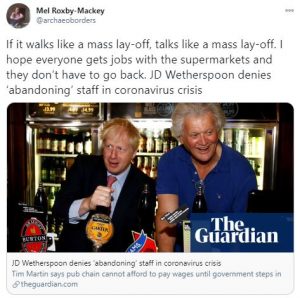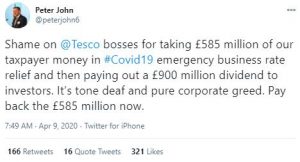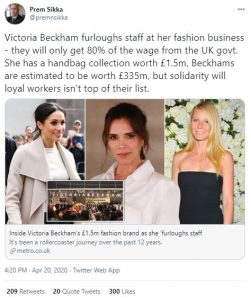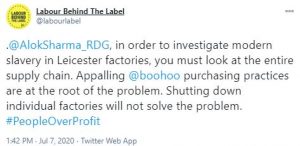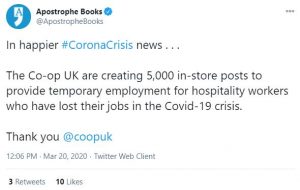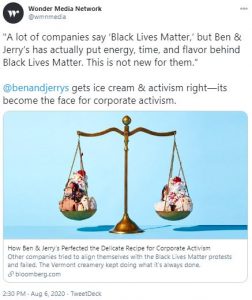Given the events of 2020, it’s no surprise that all eyes have been on corporate behaviour and which companies’ reputations have taken a nosedive as a result of their actions, or inactions.
We’ve done a trawl of social media to bring you our list of winners and losers in 2020. Whose reputational missteps have whipped up a social media storm, and whose acts of authenticity and kindness have seen their profiles rise favourably?
The Losers
Wetherspoons
At the start of the national lockdown in March, outspoken wild-haired Wetherspoons honcho Tim Martin addressed his 40,000 staff by video message, telling them he could no longer pay them while his pubs were closed. He said government assistance would likely take a while to come through, advising them to find jobs in supermarkets instead. The backlash against the pub chain and Martin resulted in the #Neverspoons campaign, urging customers to boycott Wetherspoons upon re-opening.
Tesco
Back in April, Tesco announced it had paid over £900m in dividends to its shareholders, on the back of receiving £585m from the public purse in business rates relief for companies hit by the pandemic. Tesco argued it was payback to its shareholders following an accounting scandal five years ago, however the company has gone on to declare a 28.7% year on year profit for the first half of the year.
Victoria Beckham
Popstar turned fashion designer Victoria Beckham’s decision to use the government purse to furlough 25 members of staff drew swathes of negative attention. Commentators pointed at her £33m personal wealth including a handbag collection allegedly worth over £1.5m. Media and activist pressure ultimately saw her reverse her decision, after all isn’t any publicity good publicity?
Boohoo
The fast fashion brand are surely one of the biggest reputational losers of 2020, after it was discovered that workers in a Leicester factory making garments for one of its fashion brands were being paid just £3.50 an hour, way below the minimum wage, while also being accused of ignoring Covid-19 measures. The discovery led to significant divestment in the clothing company, a Commons Select Committee Inquiry into modern slavery in supply chains and Boohoo’s appointment of well-known judge and phone hacking guru Sir Brian Leverson to overhaul the company’s supply chains.
The Winners
Brewdog
Scottish craft brewers Brewdog turned production from their usual Punk IPA to hand sanitiser at the start of the pandemic in April. Despite initial mistakes with the composition of the products, the company went on to successfully provide free sanitiser to the NHS. They went a stage further as heroes of the pandemic by producing an ale they namesBarnard Castle Eye Test IPA in a blatant nod to No10 former supremo’s Durham day out, the proceeds of which went to fund production of their hand sanitiser – quite possibly the only good thing that came out of that infamous roadtrip.
Timpsons
All-round good employers Timpsons took their ethical business practices a stage further during the Covid pandemic. Well known for giving employment opportunities to ex-offenders and offering staff benefits including days off on their birthdays as well as holiday homes they can use, Timpsons topped up furlough payments to 100% for all its staff, costing them an estimated £500k a week. CEO John Timpson said “It’s worth every penny to help our colleagues and their families through some tough weeks.”
Co-op
The Co-op created 5,000 new jobs in its stores in April to cope with increased demand at the supermarket. They specifically targeted these openings at people who had been made redundant in the hospitality sector, seeing the positions filled in record time.
Ben and Jerry’s
Following the Black Lives Matters protests in early summer many organisations were accused of posturing, broadcasting meaningless statements with little evidence of any change in corporate behaviour. But ice cream rebels Ben and Jerry’s went further, issuing an edict for brand loyalists to come together to “dismantle white supremacy”. The CEO consulted black activist organisations, publishing a 700-word statement which was praised as the most powerful message from any corporate organisation seeking to condemn not only the murder of George Floyd but also other acts of brutality against the black community.
There are many more heroes and villains of 2020 whose behaviour has been held to account in the Twittersphere, but with the Covid-19 crisis bringing a sense of togetherness and unity it does beg the question – has their reputation been damaged irreparably, or can they bounce back in 2021? Do the baddies even care? The court of public opinion will decide, and as ever there’s no better insight than on social media.

 Social Due Diligence
Social Due Diligence 